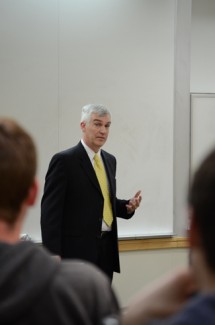Global security expert, Frederick Flietz, began his speech — “Spying and Leaks at Home and Abroad: The NSA, CIA, and Edward Snowden” — by refusing to reveal any information not previously leaked by Edward Snowden.

Flietz worked for the CIA as a senior analyst for almost 20 years and spoke Wednesday at the University of Idaho.
“Let me tell you what I think about Mr. Snowden,” Flietz said. “Mr. Snowden, in my opinion, is a traitor. He took it upon himself to steal 1.6 million classified documents.”
Flietz mentioned three things Snowden leaked regarding the NSA, which were criticized by the media. The first of these was metadata — information wireless carriers get about the location of calls and by what numbers the calls are made, with the intent of gathering connections to identify and prevent terrorist attacks. Flietz said President Barack Obama’s plan to have phone companies keep the records will only complicate the issue further.
“These are not great solutions, because it involves many more people in a variety of different companies … it’s going to make it more complicated and time consuming for NSA to obtain it,” Flietz said.
The second of the three leaks Flietz addressed was the spying on U.S. foreign allies. Flietz said although many of the United States’ European allies are angry now, it will most likely blow over — except for Germany and the scandal with Chancellor Angela Merkel.
Flietz said although he agrees with Obama’s plan to stop spying on U.S. allies, it makes him wary.
“I’m worried that a large set, a large exemption, would deny us crucial information,” Flietz said.
The final thing Flietz mentioned was big data, which is used by major companies like Google and Apple, to monitor purchases made by different demographics, in order to strategize advertisements for the individual consumer. Flietz said he agrees big data should be studied, but thinks it should be on a broader scheme than is planned. Flietz said big data could be utilized for a greater good.
Flietz said media coverage of U.S. intelligence agencies has always been about the negative aspects. He gave the example of 9/11. Flietz said 9/11 was a situation where the system didn’t work, but the outcome was better quality intelligence agencies.
“One thing that I think is better, is that there’s better coordination,” Flietz said. “We know one reason that 9/11 happened was that intelligence agencies were not sharing information.”
Flietz said the negative coverage of intelligence agencies by the media can actually be a positive thing. According to Flietz, under the constant threat of harsh media coverage, intelligence agencies are forced to perform to the best of their abilities.
In fact, Flietz said coverage of intelligence agency’s successes can pose a threat to national security. He gave an example of the CIA monitoring Al Qaeda plans and preventing attacks on embassies, thus saving many innocent lives. The media gave coverage of this success, and because of it Al Qaeda was able to pinpoint how the CIA monitored them and blocked their access.
Flietz said despite this, most coverage on intelligence agencies is sensationalized to extreme levels. He said a lot of the sensationalism comes from the influence of
politicians and their agendas for upcoming elections.
“I think when you prepare to go in the voting booth you have to make a decision,” Flietz said. “You have to say to yourself, ‘Is this a dedicated, progressive or libertarian with real privacy concerns? Or is this a politician who’s trying to scare me to get votes?'”
When asked if the rivalry between the FBI and the CIA was sensationalized by the media, Flietz said there is an element of rivalry there, but it’s exaggerated in the news. Flietz ended his speech by making a point that while intelligence agencies will likely continue to be criticized by the public, they still remain essential to U.S. national security.
“It’s unfortunate that we live in a world where we have to have programs like this,” Flietz said. “But we all know that’s the world we live in, and that’s why we have to have these things.”
Erin Bamer can be reached at [email protected]
